Hong Kong News

Hong Kong's 'zero Covid' strategy frustrates travel-starved residents
In 2019, residents made 94.7 million departures, according to the Hong Kong Census and Statistics Department.
The year prior, they spent an estimated $26.5 billion -- making it the world's 11th largest tourism market in terms of spending, based on United Nations figures.
Japan, Taiwan, Thailand, South Korea and mainland China made regular appearances on weekend itineraries and business routes, while Europe, North America and Australia lured Hongkongers for longer getaways.
But since the pandemic began, residents have been effectively grounded due to a mix of travel bans and one of the world's longest quarantines.
Fully inoculated arrivals must undergo self-funded quarantine in a government-approved hotel for 7 to 21 days, as of August 9.
Hope for any forthcoming travel bubbles has waxed and waned at the same time. Authorities dangled the possibility of an agreement with Singapore twice before shelving it indefinitely in May.
On the other hand, Hong Kong's safety measures have kept infection rates low, with just 12,020 total cases and 212 deaths in the city of 7.5 million as of August 10.
And while thankful to be safe, some residents feel jealous, dejected and outright angry as they watch other parts of the world reopen.
"At first, I felt lucky to be living in Hong Kong. I felt proud of how we handled the pandemic as a city and fortunate that we didn't have serious home lockdowns. But now the pendulum has swung in the opposite direction," Liza, an employee at an international bank who was born and raised in Hong Kong, tells CNN Travel. (She did not want her last name used because of her employer's media policies.)
"Whether to see family abroad or to take a break from our very busy, stressful lives, travel is extremely important to me. It's the reason I work and save money -- to have something to look forward to."
An enviable safety record
Over the past 18 months, many have looked to Hong Kong as an example of how to contain Covid-19 effectively.
When the first case emerged in the city in January 2020, the community set the tone by donning masks, working from home, heightening sanitization measures and social distancing.
In March 2020, while the US and Europe confronted devastating outbreaks, the Hong Kong government rolled out a slew of safety measures: the city shut the borders to non-residents, limited gatherings to four people, halved restaurant capacity, extended school closures and temporarily shut down clubs, karaoke lounges, bars, gyms and beauty salons.
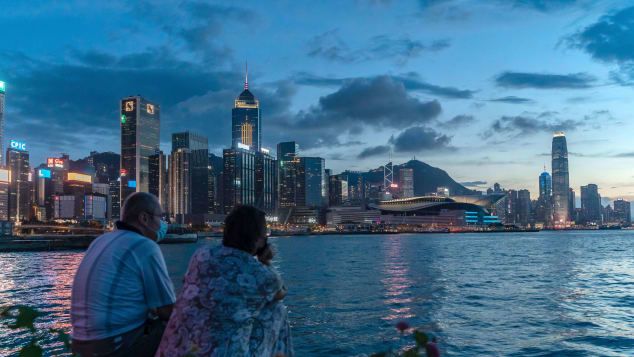 A couple takes in the Hong Kong sunset on July 30, 2020.
A couple takes in the Hong Kong sunset on July 30, 2020.
Since then, officials have flicked restrictions off and on in the face of second, third and fourth waves.
Some rules -- like compulsory mask-wearing and group dining limits -- have been widely accepted as prudent.
Others, such as a ban on birth partners in delivery rooms, surprise district-wide lockdowns, beach closures and rapidly changing travel restrictions, have drawn intense debate.
"Coming off the back of the 2019 protests, then experiencing pandemic restrictions ... It affected my mental health much more than I thought it would," says Liza.
"We took travel for granted before. I am grateful that we are safe here, but I think the restrictions err on the side of being overly cautious."
Singapore out of reach
In the summer of 2020, avid travelers saw a glimmer of hope.
The government announced that a quarantine-free Singapore travel corridor would be coming down the runway, set to launch in November 2020.
However, just before it took off, officials scrapped the plan due to a sudden jump in infections in Hong Kong.
Like a boomerang, the government re-tightened social distancing restrictions and prohibited all arrivals -- including Hong Kong residents -- from the UK.
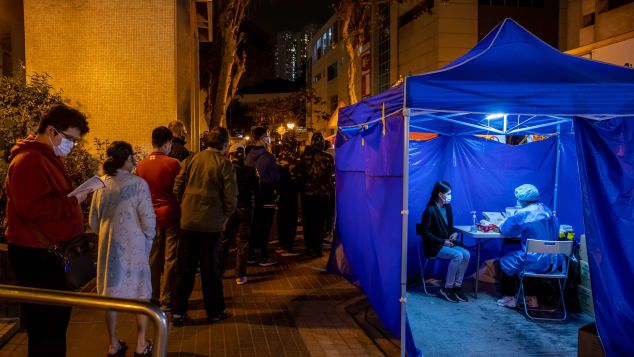 Hong Kong residents wait in line for Covid-19 tests on January 31, 2021.
Hong Kong residents wait in line for Covid-19 tests on January 31, 2021.
Authorities lifted the UK ban in May 2021, only to reinstate it on July 1 due to a Delta variant surge, then lift it again on August 9.
Hong Kong and Singapore resumed talks on the long-awaited travel bubble in 2021. But the plan fell through for a second time in May, this time due to an outbreak in Singapore.
Singapore's plans to move away from a "Zero Covid" strategy -- which is crucial for Hong Kong's desired bubble with mainland China -- also influenced the decision, according to the Straits Times.
Complicating matters, Hong Kong is nowhere near its vaccination goal of inoculating 70% of the population by September.
Despite rolling out an efficient, well-organized campaign in February, the city has fully inoculated just 40.4% of residents as of August 10.
"It's a travel issue, but also a vaccination issue. You can't have one without the other," Liza says.
"I get pretty frustrated when I see just general apathy and so much misinformation. A former co-worker said they were not getting vaccinated because a psychic on TV told them not to.
"That makes me angry because it is unlikely we will have the freedom to travel again until more people get vaccinated."
An evolving situation
Until August 9, all arrivals had to undergo a self-funded, compulsory quarantine ranging from 14 to 21 days in a designated quarantine hotel.
These stays can run anywhere from HK$400 (US$51) to HK$51,150 (US$6,581) per night, depending on what's available.
"It is designed to be prohibitive. So yes, it is to keep us safe, but also to stop us going in the first place," says Liza.
In April 2021, the government relaxed restrictions for fully inoculated residents and rolled out further adjustments on August 9, which opened the border to some fully vaccinated non-residents.
The city has also simplified its risk tiers from five to three: low, medium and high.
For low-risk destinations -- New Zealand, Australia, mainland China and Macao -- residents and non-residents can enter Hong Kong as long as they present negative PCR Covid-19 tests within 72 hours of departure and a confirmed hotel quarantine booking.
Fully vaccinated travelers must undergo a seven-day quarantine, versus 14 days if unvaccinated.
Both Hong Kong residents and fully inoculated non-residents can enter Hong Kong from medium-risk destinations, such as the US, Singapore, France, Germany and Canada.
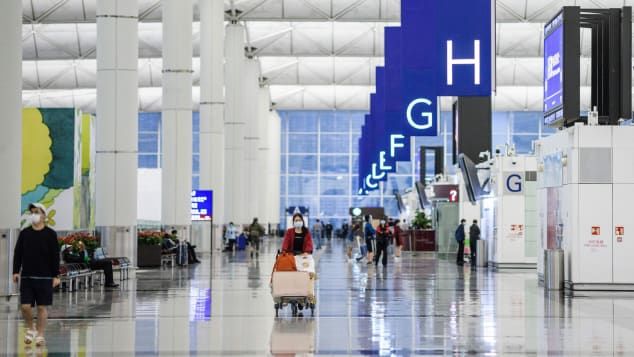 Hong Kong International Airport on March 24, 2020, hours before
non-residents were banned from entering the city in a bid to halt the
coronavirus.
Hong Kong International Airport on March 24, 2020, hours before
non-residents were banned from entering the city in a bid to halt the
coronavirus.
Non-vaccinated residents will need to quarantine for 21 days, while the fully vaccinated face a 14-day quarantine followed by seven days of self-monitoring.
Fully vaccinated travelers can shorten quarantine to seven days, followed by seven days of self-monitoring at home, if they present a positive serology
antibody test conducted within the past 91 days, or 13 weeks.
While the government has lifted blanket travel bans from high-risk places -- such as the Philippines, Indonesia, Russia, South Africa, Nepal, Ireland, India and the UK -- only fully vaccinated Hong Kong residents are allowed to board flights to the city.
In addition, arrivals need to quarantine for 21 days in a designated hotel, followed by seven days of self-monitoring.
Among the updated policies, authorities also eased restrictions for children under 12, who may finish their quarantine period at home as long as the entire household is fully vaccinated.
The Hong Kong government insists its requirements, including multiple tests before boarding flights, on arrival and during and after quarantines, represent a science-based approach. "These measures are adjusted when appropriate with a view to building an anti-epidemic barrier to prevent the importation of cases," it said in a statement.
It said it would continue to assess risks and a "basket of factors" before changing testing, boarding and quarantine requirements.
CNN Travel contacted the Hong Kong government for additional comment but did not hear back before publication.
A roller coaster of emotions
The ever-changing rules and regulations have been head-spinning and frustrating for many would-be travelers.
Among them is Maisie Fairweather, an elementary school teacher from the UK, who taught in Thailand before relocating to Hong Kong in 2019.
Fairweather traveled all over Southeast Asia before the pandemic, frequently taking long weekends away with her partner and friends.
After a trip to the Philippines during Lunar New Year in 2020, Fairweather had her first taste of travel in a pandemic world.
"We'd had an incredible trip with friends, but suddenly everything got quite scary quite quickly," she says. "Our flight back was canceled, I believe because of case numbers in Hong Kong and China, and we ended up having to travel to Taiwan to get home."
That would be her last trip for 18 months. She says the current restrictions are "infuriating, heartbreaking and cruel," because they keep families apart.
"By far, the most difficult has been the cut off between family and friends around the world," she adds.
When the Hong Kong government reduced quarantine for fully vaccinated travelers arriving from the UK earlier this summer, she hoped to have a chance to finally visit family.
Fairweather booked flights home and couldn't wait for the reunion. Suddenly, the Hong Kong government extended quarantine back up to three weeks, regardless of vaccination status.
Then on July 1, it banned flights from the UK, derailing her long-awaited trip. Though the ban was lifted on August 9, Fairweather says it's too late to travel now due to the new school year starting on August 16.
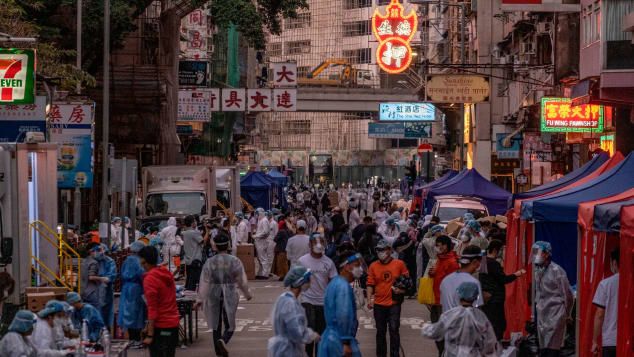 Hong Kong aims to inoculate 70% of its population by September.
Hong Kong aims to inoculate 70% of its population by September.
"It's incredibly frustrating. It feels like for every step forward, we take two steps back. I have to stay positive though and hope that these new changes pave the way for a family reunion at Christmas," she says.
"I want to stress that I am very grateful that I am safe and healthy in Hong Kong. I realize how lucky I am. But myself and countless others were left crushed -- and friends who had already left were stranded."
The most damaging part of the travel restrictions, she adds, is not the restrictions themselves but the constant changes.
"You don't dare plan anything or get your hopes up. And it seems never-ending. Just when you think there's progress, it all disappears again," she says.
Before the pandemic, Fairweather thought she'd live in Hong Kong indefinitely. But the travel restrictions are making her question that future.
"I feel frustrated, angry and hopeless sometimes. I know so many people now who have left Hong Kong to return to the UK or elsewhere ... and maybe that's our future, too. I would never have considered leaving before the pandemic.
"But now, all I can think about is that first hug with my mum -- there will not be enough tissues for all those tears of happiness!"
'Standing still in a little bubble'
When he sees people from other countries like the US and UK traveling freely, Ivor Ngo feels a pang of jealousy.
For Ngo, a sales and marketing manager born in Hong Kong, travel is one of his favorite pastimes. He used to fly to Europe for a couple of weeks every year for work and took shorter trips around Southeast Asia and Japan at least twice a year.
"This is the longest I have stayed in Hong Kong since I was 18," he says.
"My friends and I used to say that people in the US or UK were irresponsible for traveling ... But now, we understand that there is nothing we can do to make this virus go away. We believe that if we do everything we can to protect ourselves and others, we should be able to travel."
If the lengthy quarantine restrictions for vaccinated residents continue, Ngo says he may move away from Hong Kong.
"I am already exploring opportunities to relocate to other countries. At 31, I am at an age where I can afford to -- and should embrace new adventures."
While home to many parks, hiking trails and beaches, Hong Kong is more compact than other places in Asia-Pacific. Unlike Australia, Thailand or mainland
China, where residents can enjoy more domestic travel opportunities, Hongkongers do not have as many options.
And many of the usual domestic tourism sites, from the fishing village of Tai O and the Shek O beach to the outlying islands and Sai Kung, have been overrun with residents looking for a break.
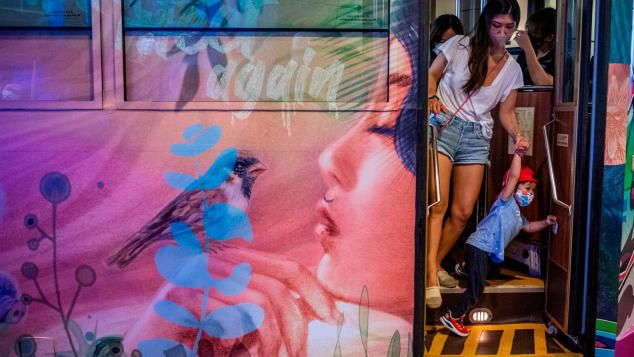 A woman and child exit a Hong Kong tram on June 26, 2021. The city has reported few Covid cases in recent months.
A woman and child exit a Hong Kong tram on June 26, 2021. The city has reported few Covid cases in recent months.
"Knowing you can do all that out there, but you're trapped in Hong Kong instead ... That is just not living," says Ngo.
Liza agrees. "When I see the rest of the world learning to live with this horrific virus, I feel like my freedom is being taken away," she says.
"I don't care about going to a restaurant. Or a gym. I care about being able to travel to see family and friends, and have a mental break from this intense time.
We would probably be thinking about leaving if we didn't have so many roots here."
It's as though Hong Kong is "just standing still in a little bubble", she adds. While the city has successfully kept people safe, it has been emotionally and psychologically very challenging.
"People can continue as 'normal' because we aren't in lockdown, but this is not normal."
Responsible or overly restrictive?
While thankful the government lifted flight bans from the UK, some Hong Kong residents feel the compulsory 21-day quarantine for fully vaccinated residents is still too prohibitive.
"We could do seven days in a hotel room with a baby, then seven days home quarantine with monitoring and several tests," says Liza, who has a six-month-old. "But I think 21 days is too much. We need to find a way to live with this moving forward."
Iris Law, a wellness coach and author born in Hong Kong, says she feels the restrictions are justified, though 14 days would be more palatable for vaccinated residents arriving from higher-risk areas.
"Quarantine requirements and travel bans are not something that most people would welcome, but I do feel that they are necessary to be implemented due to the long incubation period of Covid-19, possible severity of the sickness and the fast-spreading new variant," says Law.
"Stats tell us that these controls that we have in place have proven to be more effective in controlling the spread than countries with looser rules.
"Especially in Hong Kong, where it's very densely populated, I do believe that the various regulations have prevented us from a complete lockdown so far."
Pre-pandemic, the Hong Kong native frequently traveled for holidays and work, particularly to Japan, where she visited five to six times a year. And while she misses traveling, she says safety should be the top priority.
With new variants emerging abroad and low vaccination rates locally, Law does not think it would be safe to open the borders anytime soon.
"I believe Hong Kong will have travel bubbles with nearby places in the next one to two years," says Law. "Sadly, I don't think it is likely that we can resume normal free travel for at least three to four years."











